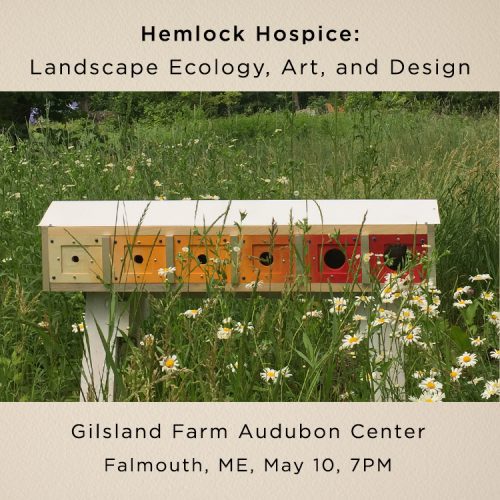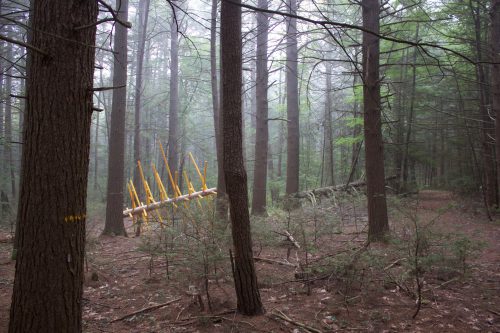
Thursday, May 10 at 7pm
Co-presented by David Buckley Borden, artist/designer, and Aaron M. Ellison, Senior Ecologist, Harvard Forest, this Speaker Series event will look at the intersection of ecology, art, and design as viewed through the lens of the Hemlock Hospice project.
This immersive, site-specific science-communication project tells the story of the ongoing demise of the eastern hemlock tree at the hands (and mouth) of a tiny aphid-like insect, the hemlock wooly adelgid. While telling the story of the loss of eastern hemlock, the project addresses larger issues of climate change, human impact, and the future of New England forests.

About David Buckley Borden
David Buckley Borden is a Cambridge-based interdisciplinary artist and designer known for his creative practice of making ecological issues culturally relevant to the general public by means of accessible art and design. David studied landscape architecture at Harvard University’s Graduate School of Design and worked with Sasaki Associatesand Ground before focusing his practice at the intersection of landscape, creativity,and cultural event. David’s work now manifests in a variety of forms, ranging from site-specific landscape installations in the woods to data-driven cartography in the gallery. David’s place-based projects highlight both pressing environmental issues and everyday phenomena and have recently earned him residencies at the Santa Fe Art Institute, Teton Art Lab, Trifecta Hibernaculum, and MASS MoCA. David is an Associate Fellow at the Harvard Forest where he works with scientists to answer the question, “How can art and design foster cultural cohesion around environmental issues and help inform ecology-minded decision making?”
About Aaron M. Ellison
Aaron M. Ellison is the Senior Research Fellow in Ecology in Harvard’s Department of Organismic and Evolutionary Biology and Senior Ecologist at the Harvard Forest,and a semi-professional photographer and writer. He studies the disintegration and reassembly of ecosystems following natural and anthropogenic disturbances; thinks about the relationship between the Dao and the intermediate disturbance hypothesis; reflects on the critical and reactionary stance of Ecology relative to Modernism, blogs as The Unbalanced Ecologist, and tweets as @AMaxEll17. He is the author of A Primer of Ecological Statistics (2004), A Field Guide to the Ants of New England (2012; recipient of the 2013 USA Book News International Book Award in General Science, and the 2013 award for Specialty Title in Science and Nature from The New England Society in New York City), and Vanishing Point (2017), a collection of photographs and poetry from the Pacific Northwest). On weekends, he works wood.
20 Gilsland Farm Road, Falmouth ME

